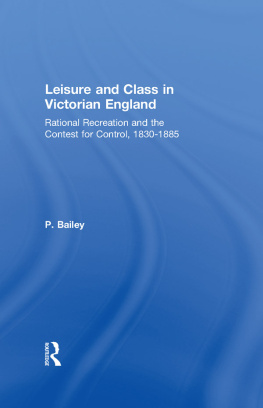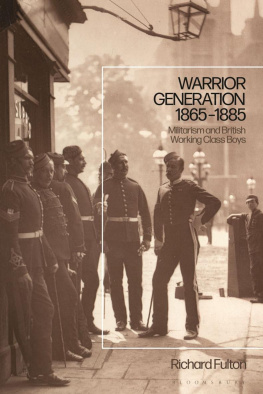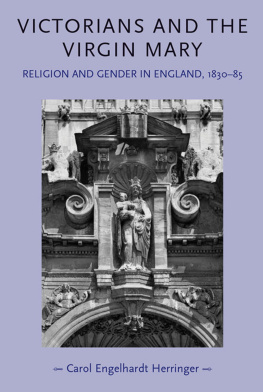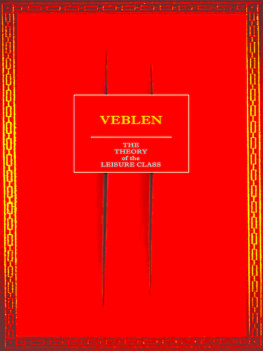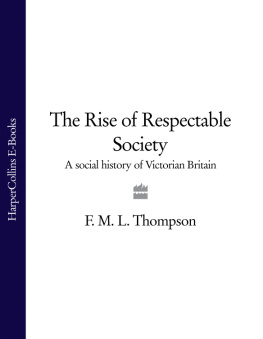First published in 1978
This edition published in 2007 by
Routledge
2 Park Square, Milton Park, Abingdon, Oxon, OX14 4RN
Routledge is an imprint of Taylor & Francis Group, an informa business
Printed and bound in Great Britain
1978 Peter Bailey
All rights reserved. No part of this book may be reprinted or reproduced or utilized in any form or by any electronic, mechanical, or other means, now known or hereafter invented, including photocopying and recording, or in any information storage or retrieval system, without permission in writing from the publishers.
The publishers have made every effort to contact authors and copyright holders of the works reprinted in the Studies in Social History series. This has not been possible in every case, however, and we would welcome correspondence from those individuals or organisations we have been unable to trace.
These reprints are taken from original copies of each book. In many cases the condition of these originals is not perfect. The publisher has gone to great lengths to ensure the quality of these reprints, but wishes to point out that certain characteristics of the original copies will, of necessity, be apparent in reprints thereof.
British Library Cataloguing in Publication Data
A CIP catalogue record for this book
is available from the British Library
Leisure and Class in Victorian England
ISBN10: 0-415-41295-1 (volume)
ISBN10: 0-415-40266-2 (set)
ISBN13: 978-0-415-41295-7 (volume)
ISBN13: 978-0-415-40266-8 (set)
Routledge Library Editions: Studies in Social History
LEISURE AND CLASS IN
VICTORIAN ENGLAND
Rational recreation and the contest for control,
18301885
Peter Bailey
Department of History
University of Manitoba
LONDON: Routledge & Kegan Paul
TORONTO AND BUFFALO: University of Toronto Press
First published in 1978
in Great Britain
by Routledge & Kegan Paul Ltd
and in Canada and the United States of America by
University of Toronto Press
Toronto and Buffalo
Printed in Great Britain by
Redwood Burn Limited
Trowbridge & Esher
Copyright Peter Bailey 1978
No part of this book may be reproduced in
any form without permission from the
publisher, except for the quotation of brief
passages in criticism
British Library Cataloguing in Publication Data
Bailey, Peter, b. 1937
Leisure and class in Victorian England (Studies
in social history)
.1. Recreation Great Britain History
19th century
I. Title II. Series
301.570941 GV75 78-40390
RKP ISBN 0 7100 8849 3
UTP ISBN 0 8020 2258 8
The writing of this book has been a protracted and mostly solitary endeavour. Though I may have unwittingly rubbed shoulders with the greats in the anonymous intimacy of the British Museum Reading Room and the various waterholes in its vicinity, I have had no readily available group of fellow social historians of the period to use as a sounding board for my work, no intellectual kitchen cabinet to expedite the painful process whereby the tyro's half-baked ideas cohere into a sufficiently substantial dish to set before a wider public. But if therefore my errors be legion, my acknowledgments are few.
I do owe a considerable debt to the often dauntingly high quality work of many of the scholars who have pioneered the social history of the period, in this and complementary fields, and my gratitude on this account is particularised in the notes. I am also grateful to Dr John Norris for his sympathetic and effective supervision of my 1974 University of British Columbia thesis which provided the basis for this book. For various other forms of encouragement, kindness and assistance I would like to thank Eric Sager, Jim Winter, Ed Hundert, Raphael Samuel, Margaret Elsworth, Mrs Zena Ward, the editors of this series, and John The Throat Blackwell. I have also to thank Victorian Studies and the Trustees of Indiana University for their permission to reproduce in material which formed a substantial part of my article of autumn 1977, A mingled mass of perfectly legitimate pleasures: the Victorian middle class and the problem of leisure. I am further indebted to the Canada Council and the University of Manitoba Research Board for the generous financial assistance without which this study could have been neither undertaken nor brought to conclusion. Canada in general has been good to me.
My greatest debt is to my wife Bonnie, who has shared much of the burden of this enterprise; in addition to her considerable secretarial skills she has provided just the right mix of psychological support and petticoat government to keep the self-doubting writer at his task. We look forward to savouring some leisure of our own.
P.C.B.
Winnipeg
1978


Leisure is widely recognised as an increasingly significant component of life in modern Western society and has for some time been given serious attention by sociologists and a variety of social commentators and planners, yet it is an area which until recently has been greatly neglected by historians. In the latters' conventional hierarchy of human activities, leisure has most often been a mere appendix, an unexplored and scarcely acknowledged minor tributary to the mainstream of history. The subject has been left to the amateur student of manners, the antiquarian or the folklorist, whose enthusiasms and industry have rarely been matched by any regard for historical perspective or social context. Within the last few years, however, the increasing range and confidence of the modern social historian (a pullulating breed) have brought several aspects of the field under scholarly examination. In the new canon of studies, leisure time and its activities are acknowledged as a significant element of social experience, whose history is of particular importance in the broader exercise of reconstructing the kind of life lived by the ordinary people of the past. To this end, the main focus of recent attention has been on popular rather than litist recreations, though the best of the new work has been Concerned to understand them not only in the context of their own culture but in relation to the structure of society as a whole and the wider patterns of social change. From such endeavours in modern British studies some kind of intelligible and coherent map of the field is emerging.

